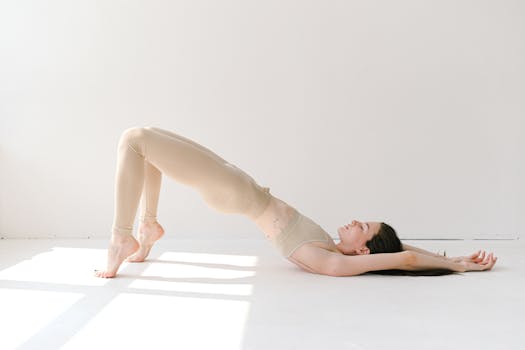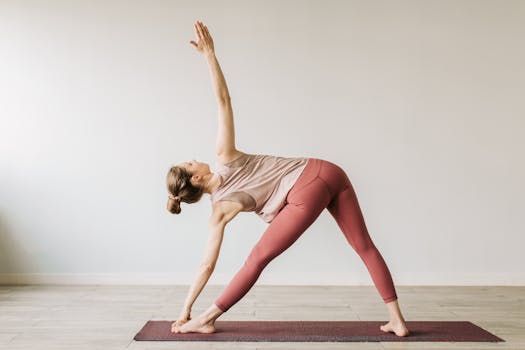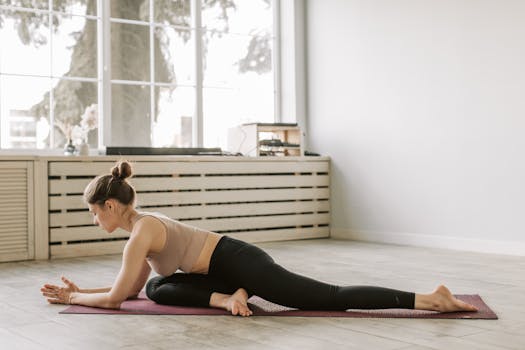
From Mat to Mind: How Yoga and Pilates Transform Your Mental Well-Being
Yoga and Pilates, two practices that originated in the early 20th century, have become increasingly popular in recent years. While they are often associated with physical exercise, their impact on mental well-being is just as significant. As someone who has practiced both yoga and Pilates for years, I can attest to their transformative power. In this article, we’ll explore the ways in which yoga and Pilates can transform your mental well-being, from reducing stress and anxiety to promoting mindfulness and self-awareness.
What is Yoga and Pilates?

Yoga, which originated in India over 5,000 years ago, is a practice that combines physical postures, breathing techniques, and meditation to promote physical, mental, and spiritual well-being. Pilates, on the other hand, is a physical fitness method developed in the early 20th century by Joseph Pilates. It focuses on strengthening the core muscles, improving posture, and enhancing flexibility and balance.
The Mental Health Benefits of Yoga and Pilates

So, how do yoga and Pilates impact mental health? Research has shown that both practices can have a profound impact on reducing stress and anxiety, improving mood, and enhancing cognitive function. By combining physical movement with deep breathing and meditation, yoga and Pilates can help calm the mind, reduce symptoms of depression and anxiety, and promote overall mental well-being.
One of the primary ways in which yoga and Pilates impact mental health is by reducing stress and anxiety. When we’re under stress, our bodies produce cortisol, a hormone that can have negative effects on our physical and mental health. Yoga and Pilates can help reduce cortisol levels by promoting relaxation, reducing muscle tension, and improving sleep quality.
In addition to reducing stress and anxiety, yoga and Pilates can also improve mood and reduce symptoms of depression. The physical movement and deep breathing techniques used in these practices can increase the production of neurotransmitters such as serotonin and endorphins, which can help improve mood and reduce symptoms of depression.
The Science Behind Yoga and Pilates

So, what’s behind the mental health benefits of yoga and Pilates? Research has shown that both practices can have a profound impact on the brain and nervous system. By combining physical movement with deep breathing and meditation, yoga and Pilates can help calm the mind, reduce symptoms of depression and anxiety, and promote overall mental well-being.
One of the key ways in which yoga and Pilates impact the brain is by reducing inflammation. Chronic inflammation is a known risk factor for depression, anxiety, and other mental health conditions. Yoga and Pilates can help reduce inflammation by promoting relaxation, reducing muscle tension, and improving sleep quality.
In addition to reducing inflammation, yoga and Pilates can also improve cognitive function. The physical movement and deep breathing techniques used in these practices can increase blood flow to the brain, improve memory and concentration, and reduce symptoms of ADHD and other cognitive disorders.
Getting Started with Yoga and Pilates

So, how can you get started with yoga and Pilates? Whether you’re a seasoned athlete or just starting out, there are many ways to incorporate these practices into your daily routine. Here are a few tips to get you started:
First, find a qualified instructor or class that suits your needs and fitness level. There are many different styles of yoga and Pilates, from gentle and restorative to more intense and physically demanding. Experiment with different styles and find what works best for you.
Second, start slow and be patient. Yoga and Pilates are practices that take time to develop, and it’s essential to listen to your body and honor its limitations. Don’t push yourself too hard, especially if you’re just starting out.
Finally, make yoga and Pilates a regular part of your routine. Aim to practice at least 2-3 times per week, and ideally every day if possible. Consistency is key when it comes to experiencing the mental health benefits of yoga and Pilates.
Conclusion

In conclusion, yoga and Pilates are two powerful practices that can have a profound impact on mental well-being. By reducing stress and anxiety, improving mood, and enhancing cognitive function, these practices can help promote overall mental health and wellness. Whether you’re a seasoned athlete or just starting out, I encourage you to give yoga and Pilates a try. With patience, dedication, and an open mind, you can experience the transformative power of these practices for yourself.



